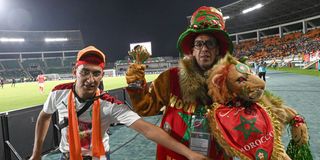Zealous journalists at Afcon media centres just another day in the office

Morocco's supporters pose at the end of their Africa Cup of Nations (CAN) 2024 group F match against Zambia at the Stade Laurent Pokou in San Pedro on January 24, 2024.
What you need to know:
- We, sports journalists often influence national team selection through public opinion, by lobbying either openly or covertly for certain players. It then becomes a double edged sword.
- When those players fail to deliver, they get hammered. When the coaches fail to call up those ‘good’ payers and things fall apart, the coach sees the kind of fire coach Chris Hughton saw on Monday.
If you still need confirmation that this is the best Afcon the world has ever seen, move your focus from the pitch and direct it at the goings-on at the media centres and mixed zones at the various stadiums in Cote d’Ivoire.
Before we go any deeper, let’s agree on two things. First, that football can drive you mad. Two, that none of us foresaw, not even Idah Peterside and Mamadou Gaye, who are the greatest football pundits Africa has ever produced, such big defeats coming.
After Morocco recorded that debilitating 1-1 draw with DR Congo on Sunday, players and coaching staff of the two teams almost got physical.
Interestingly, a similar confrontation erupted in the media centre at that same time, with journalists from the two countries almost going physical.
That was just a shadow. After the Black Stars of Ghana surrendered a two-goal lead and got bundled out of the tournament by Mozambique, frustrated Ghanaian journalists stormed the dressing room and demanded the players and coaches emerge to provide answers for their abysmal displays.
Security personnel were deployed to contain the situation as the journalists nearly turned rowdy.
My longtime friend and colleague Saddick Adams has worn so much criticism following the incident after a video emerged of him slamming the seats after the equaliser by Mozambique. Professional journalists shouldn’t act that way, right? Objectivity is the name of this game, right?
Well, only those who don't understand the passion that comes with such moments will question what these journalists did.
Me? I certainly understand their reaction, for I have been there many times. Cellestine of 10 years ago has reacted in shades not far from that in the past when my favourite team lost.
I am so glad to know that from Nairobi to Kumasi to Abidjan to Kinshasa to Rabat, a passionate journalist’s reaction to defeat is the same.
What most people don’t understand is that those Ghanaian journalists are still hungover from the golden generation of Michael Essien, Sulley Muntari and Stephen Appiah that brought Ghana onto the world stage.
Even more complicated is the fact that some journalists sponsor themselves to tournaments like these, and depend on their team’s success to continue getting sponsors. There are so many moving parts.
That said, and at the risk of being accused of doublespeak, it must be said that meting out violence to any player or coach, or intimidating them, is wrong. Additionally, some of the frustrations are self-inflicted, and here I will reveal a little secret.
We, sports journalists often influence national team selection through public opinion, by lobbying either openly or covertly for certain players. It then becomes a double edged sword.
When those players fail to deliver, they get hammered. When the coaches fail to call up those ‘good’ payers and things fall apart, the coach sees the kind of fire coach Chris Hughton saw on Monday.





